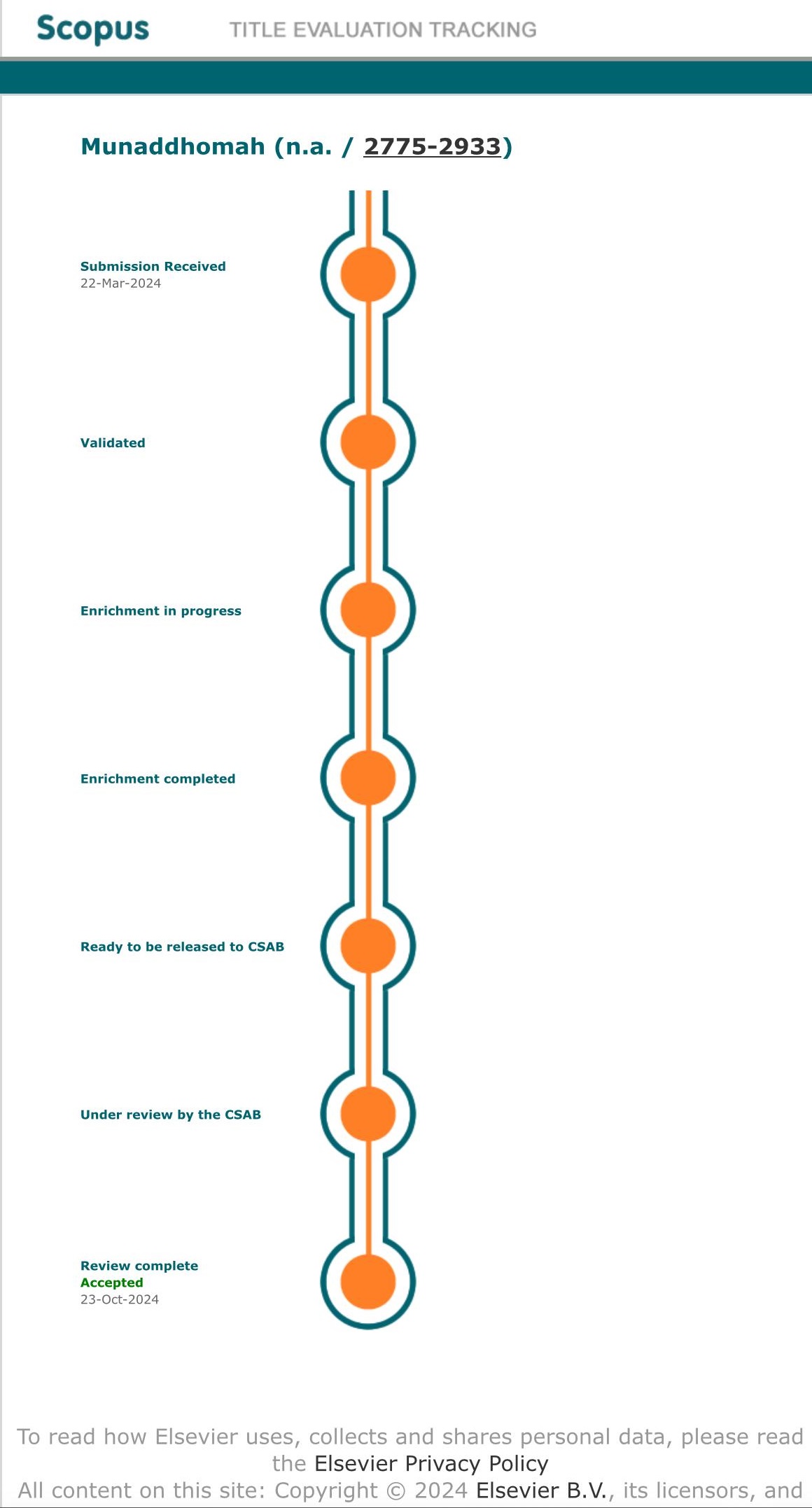Management of Strengthening Character Education in Junior High School
DOI:
https://doi.org/10.31538/munaddhomah.v5i2.778Keywords:
School Management, Character Education, Islamic SchoolAbstract
This article aims to analyze the management of character education at MTs Raudlatusy Syubban Pati (Junior high school). This research uses a case study research model using a qualitative approach. The data collection techniques used in this study are observation, interview, and documentation. The results of research related to the management of strengthening character education in the case of studies at MTs Raudlatusy Syubban in this study, supporting education must fulfill the following aspects, referring to the school's vision and mission, conducting assessments to identify school potential, formulating and determining the main character values to be developed, school programs are compiled jointly with all school components, and teachers make character-based learning devices RPP (lesson plan). Character education in MTs Rudlatusy Syubban must continue to be improved because character is the main element that proves that education is successful. The more successful an education is, the better the character of the students will be. This reason is also the background for character education at MTs Raudlatusy Syubban to continue to be intensified.
Downloads
References
Badrudin, B., Satori, D., Komariah, A., & Kurniady, D. A. (2021). The Implementation of Pesantren Financing Based on Agribusiness Social Entrepreneurs. Jurnal Ilmiah Peuradeun, 9(1), Article 1. https://doi.org/10.26811/peuradeun.v9i1.504
Balg, D. (2023). Moral Disagreement and Moral Education: What’s the Problem? Ethical Theory and Moral Practice. https://doi.org/10.1007/s10677-023-10399-9
Bauer, K., & Hermann, J. (2022). Technomoral Resilience as a Goal of Moral Education. Ethical Theory and Moral Practice. https://doi.org/10.1007/s10677-022-10353-1
Begum, A., Liu, J., Qayum, H., & Mamdouh, A. (2022). Environmental and Moral Education for Effective Environmentalism: An Ideological and Philosophical Approach. International Journal of Environmental Research and Public Health, 19(23), 15549. https://doi.org/10.3390/ijerph192315549
Berglund, J. (2017). Continuity and Change: Experiences of Teaching Religious Education in the Light of a Life Trajectory of Hifz and Secular Education. Religion & Education, 44(1), 88–100. https://doi.org/10.1080/15507394.2016.1267544
Bogdan, R., & Biklen, S. K. (2007). Qualitative Research for Education: An Introduction to Theories and Methods. Pearson A & B.
Chowdhury, M. (2018). Emphasizing morals, values, ethics, and character education in science education and science teaching. MOJES: Malaysian Online Journal of Educational Sciences, 4(2), 1–16.
Faiz, A., & Soleh, B. (2020). Evaluasi Penguatan Pendidikan Karakter melalui Program Pembiasaan Menyanyikan Lagu-lagu Kebangsaan. Jurnal Education and Development, 8(3), 561778. https://doi.org/10.37081/ed.v8i3.1905
Fasya, A., Darmayanti, N., & Arsyad, J. (2023). The Influence of Learning Motivation and Discipline on Learning Achievement of Islamic Religious Education in State Elementary Schools. Nazhruna: Jurnal Pendidikan Islam, 6(1), Article 1. https://doi.org/10.31538/nzh.v6i1.2711
Handoko, S., & Sakti, S. A. (2023). Optimizing Classroom and Activity-Based Character Education: A Comprehensive Guide to Best Practices and Implementation Strategies in Early Childhood Education. Golden Age: Jurnal Ilmiah Tumbuh Kembang Anak Usia Dini, 8(2), Article 2. https://doi.org/10.14421/jga.2023.82-03
Haq, E. A., Wasliman, I., Sauri, R. S., Fatkhullah, F. K., & Khori, A. (2022). Management of Character Education Based on Local Wisdom. Nidhomul Haq : Jurnal Manajemen Pendidikan Islam, 7(1), Article 1. https://doi.org/10.31538/ndh.v7i1.1998
Hsiao, H.-C. (2021). Effects of Defense Suppliers’ Practice of Online Character Education on the Employees’ Learning Motivation and Perception of Integrity During COVID-19. Frontiers in Psychology, 12, 771124. https://doi.org/10.3389/fpsyg.2021.771124
Huang, X., Chin-Hsi, L., Mingyao, S., & Peng, X. (2021). What drives teaching for creativity? Dynamic componential modelling of the school environment, teacher enthusiasm, and metacognition. Teaching and Teacher Education, 107, 103491. https://doi.org/10.1016/j.tate.2021.103491
Hur, Y. (2021). Definition of character for medical education based on expert opinions in Korea. Journal of Educational Evaluation for Health Professions, 18, 26. https://doi.org/10.3352/jeehp.2021.18.26
Hur, Y., Yeo, S., & Lee, K. (2022). Medical students’ self-evaluation of character, and method of character education. BMC Medical Education, 22(1), 271. https://doi.org/10.1186/s12909-022-03342-6
Komalasari, M., & Yakubu, A. B. (2023). Implementation of Student Character Formation Through Islamic Religious Education. At-Tadzkir: Islamic Education Journal, 2(1), Article 1.
Komariah, N., & Nihayah, I. (2023). Improving The Personality Character of Students Through Learning Islamic Religious Education. At-Tadzkir: Islamic Education Journal, 2(1), Article 1. https://doi.org/10.59373/attadzkir.v2i1.15
Lee, C.-Y., Pan, P. J. D., Liao, C.-J., Chen, H.-Y., & Walters, B. G. (2013). E-character education among digital natives: Focusing on character exemplars. Computers & Education, 67, 58–68. https://doi.org/10.1016/j.compedu.2013.02.020
Lickona, T. (2009). Educating for Character: How Our Schools Can Teach Respect and Responsibility. Random House Publishing Group.
Martin, A. J., Collie, R. J., Stephan, M., Flesken, A., Halcrow, F., & McCourt, B. (2024). The role of teaching support in assisting students’ transition to high school. Learning and Individual Differences, 102382. https://doi.org/10.1016/j.lindif.2023.102382
Moleong, L. J. (1989). Metodologi penelitian kualitatif. Remadja Karya.
Muassomah, M., Abdullah, I., Hasanah, U., Dalmeri, D., Sihombing, A. A., & Rodrigo, L. (2022). The Academic Demoralization of Students in Online Learning During the COVID-19 Pandemic. Frontiers in Education, 7, 888393. https://doi.org/10.3389/feduc.2022.888393
Palunga, R., & Marzuki, M. (2017). Peran Guru Dalam Pengembangan Karakter Peserta Didik Di Sekolah Menengah Pertama Negeri 2 Depok Sleman. Jurnal Pendidikan Karakter, 8(1). https://doi.org/10.21831/jpk.v7i1.20858
Panoyo, P., Riyanto, Y., & Handayaningrum, W. (2019). Manajemen Penguatan Pendidikan Karakter Pada Sekolah Menengah Atas. Halaqa: Islamic Education Journal, 3(2), 111–117. https://doi.org/10.21070/halaqa.v3i2.2714
Realita, F., & Rahmawati, A. (2016). Pengetahuan Remaja Putri Tentang Kehamilan Tidak Diinginkan. Jurnal Kebidanan. https://doi.org/10.35872/jurkeb.v8i02.216
Rehren, P., & Sauer, H. (2022). Another Brick in the Wall? Moral Education, Social Learning, and Moral Progress. Ethical Theory and Moral Practice. https://doi.org/10.1007/s10677-022-10351-3
Rokhman, F., Hum, M., Syaifudin, A., & Yuliati. (2014). Character Education for Golden Generation 2045 (National Character Building for Indonesian Golden Years). Procedia - Social and Behavioral Sciences, 141, 1161–1165. https://doi.org/10.1016/j.sbspro.2014.05.197
Ülger, M., Yiğittir, S., & Ercan, O. (2014). Secondary School Teachers’ Beliefs on Character Education Competency. Procedia - Social and Behavioral Sciences, 131, 442–449. https://doi.org/10.1016/j.sbspro.2014.04.145
Wringe, C. (2006). Moral Education: Beyond the Teaching of Right and Wrong. Springer Science & Business Media.
Downloads
Published
How to Cite
Issue
Section
License
Copyright (c) 2024 Nizar Naufal, Muh. Nur Rochm Maksum

This work is licensed under a Creative Commons Attribution-ShareAlike 4.0 International License.
Munaddhomah: Jurnal Manajemen Pendidikan Islam is licensed under a Creative Commons Attribution-ShareAlike 4.0 International License.
Based on a work at https://pasca.jurnalikhac.ac.id/index.php/munaddhomah

















